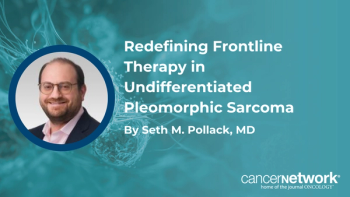
Neoadjuvant Nivolumab/Chemo Combo Yields Significant EFS Improvement in Resectable NSCLC
Findings from the CheckMate 816 trial indicated that the combination of nivolumab and chemotherapy as neoadjuvant therapy resulted in a significant event-free survival benefit for patients with resectable non–small cell lung cancer.
Treatment with neoadjuvant nivolumab (Opdivo) plus chemotherapy resulted in a significant improvement in event-free survival (EFS) among patients with resectable non–small cell lung cancer (NSCLC), according to findings from the phase 3 CheckMate 816 study (NCT02998528).1
In addition to yielding a statistically significant improvement in EFS over chemotherapy alone, the combination has previously demonstrated a significant improvement in pathologic complete response (pCR) rate within this patient population.2 Results from the trial indicated that patients who received nivolumab and chemotherapy had a pCR rate of 24% vs 2.2% among those who were treated with chemotherapy alone (OR, 13.94; 99% CI, 3.49-55.75; P <.0001).
Full findings from CheckMate 816 will be presented at an upcoming medical conference.
“While the intent of surgery is curative in resectable NSCLC, between 30% to 55% of patients experience recurrence after surgery and ultimately succumb to the disease, presenting a strong need for additional options that can disrupt this cycle,” Nicolas Girard, MD, PhD, professor of respiratory medicine at Paris Saclay University and head of the Thorax Institute Curie Montsouris in Paris, said in a press release. “The positive event-free survival data seen with neoadjuvant nivolumab plus chemotherapy is groundbreaking and can have important implications for how we treat resectable NSCLC.”
Investigators enrolled patients with stage IB to IIIA resectable NSCLC with an ECOG performance status of 1 or less and no EGFR or ALK alterations.3 Patients were randomized to receive 360 mg of nivolumab plus chemotherapy every 3 weeks (n = 179) or the same chemotherapy backbone every 3 cycles (n = 179).
In total, 64% of patients have stage IIIA disease. Additionally, 83% of patients in the combination arm and 75% of those in the chemotherapy arm underwent definitive surgery. Surgery was cancelled for patients who experienced disease progression or adverse effects (AEs) as well as for other reasons.
Notably, no increase in median duration of surgery and length of hospitalization was observed between the 2 arms. Grade 3/4 surgery-related AEs were reported in 2 patients in the combination arm and no patients in the chemotherapy arm. No patients died due to treatment-related AEs in the experimental arm versus 2 patients on the control therapy.
References
- Neoadjuvant Opdivo (nivolumab) plus chemotherapy significantly improves event-free survival in patients with resectable non-small cell lung cancer in phase 3 CheckMate -816 trial. News release. Bristol Myers Squibb. November 8, 2021. Accessed November 8, 2021.
https://bit.ly/3bQh9aC - Neoadjuvant Opdivo (nivolumab) plus chemotherapy significantly improves pathologic complete response in patients with resectable non-small cell lung cancer in phase 3 CheckMate-816 trial. News release. Bristol Myers Squibb. April 10, 2021. November 8, 2021. https://bit.ly/3EQn77S
- Spicer J, Wang, C, Tanaka F, et al. Surgical outcomes from the phase 3 CheckMate 816 trial: Nivolumab (NIVO) + platinum-doublet chemotherapy (chemo) vs chemo alone as neoadjuvant treatment for patients with resectable non-small cell lung cancer (NSCLC). J Clin Oncol. 2021;39(suppl 15):8503-8503). doi:10.1200/JCO.2021.39.15_suppl.8503
Newsletter
Stay up to date on recent advances in the multidisciplinary approach to cancer.











































